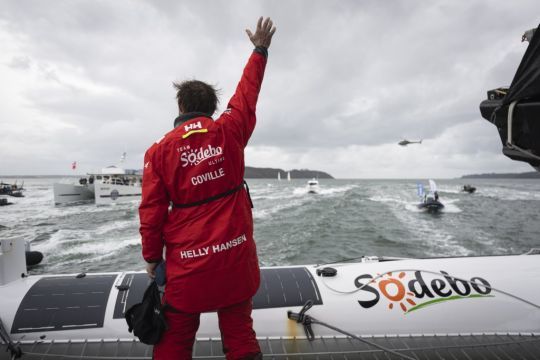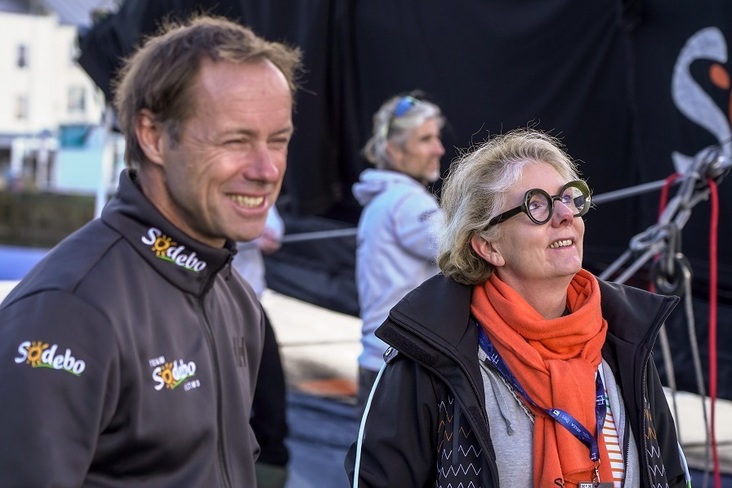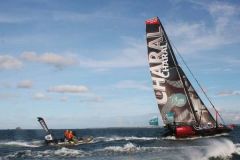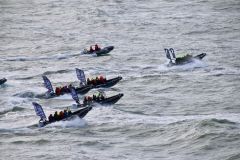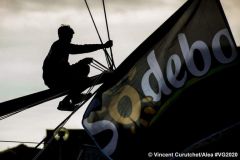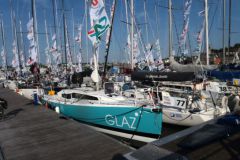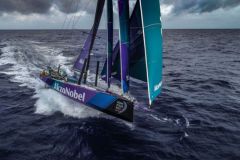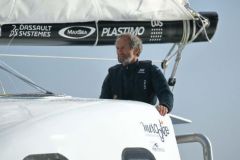You recently stepped down as president of the ULTIM class. Tell us about this incredible experience.
It lasted just over 10 years, when the project was initiated, until my resignation in September 2024. 11 years was a long time, but this joint project was so exciting that everything went by very quickly. When we launched the class, which was called "Collectif Ultim", the aim was to get these incredible boats accepted for racing, as they weren't integrated into any fleet events, only record-breaking. For the record, it was François Gabart, fresh from his Vendée Globe victory, who first called us to express his interest in the class.
Some moments were more difficult than others, like any ambitious project. But the exchanges were very rich, with wonderful encounters, and always characterized by the humility, commitment and passion of each individual.
If you do it just for yourself, there's no point. The point is to do it to share, to create opportunities to meet people at the start and finish of races.
When did Sodebo first enter the sailing world?
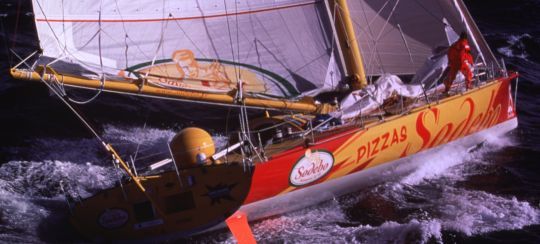
We began our sailing partnership in 1998 on a 60-foot project with another skipper. Thomas took over the reins of the project in 1999, never letting go, in order to pursue our joint project.
At the time, we launched the first IMOCA with a rotating, self-supporting wing mast, which was quite a gamble at the time. In the end, this architectural solution was not authorized for the Vendée Globe. That's the game with innovation: it has to come at the right time, and it can be delayed or postponed.
We then became a major partner of the Vendée Globe, and have been for 20 years.
How is Sailing a relevant vector of notoriety for a company like Sodebo?
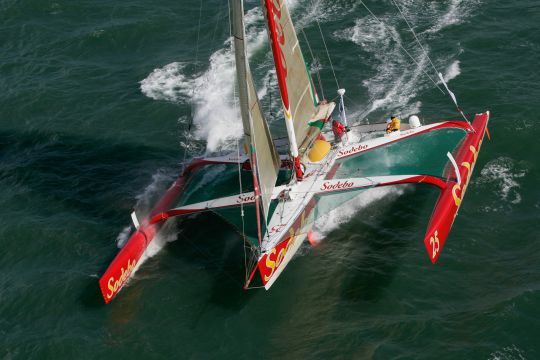
When we're in the departure village, we present the company and the boat, and this allows us to bring in our employees from all levels. There are exchanges between work colleagues, with the sailors and with the public.
It's a communication tool. But we had a choice at the outset. We could either advertise, buy space, shoot a film and create a campaign. Or we could launch ourselves into sailing sponsorship, with all the uncertainties that entails, but also all the totally different opportunities that can arise.
It's a great way to get to know your company better, and to meet new people and set up joint projects. The potential is incredible.
What prompted you to get involved in sailing sponsorship? Are you a sailor yourself?
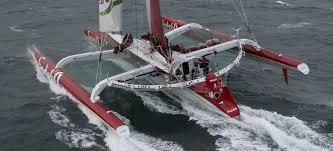
Not at all, we had no connection with the sailing world. We were approached about the IMOCA project, and we jumped at the chance.
At the time, no one in the team had thought of entering the ocean racing sector. And yet the Vendée Globe was just around the corner, just an hour's drive from our head office. But we had no idea that investing in sailing was accessible to a company like ours.
We knew nothing about it, so we surrounded ourselves with experts on the subject. Little by little, we said to ourselves "Why not? "
The project was ambitious, but it made people dream. We had a business that had made a lot of progress, but was not very well known. So we had to do something to raise our profile.
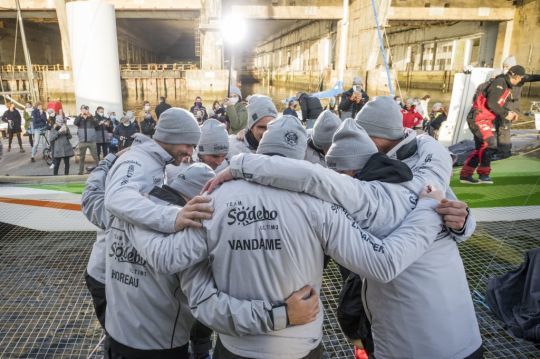
Our proximity to the Vendée region and Les Sables d'Olonne was a facilitating factor, as connections were made fairly quickly.
Whatever happens, we didn't want to do a one-shot deal with this partnership. We wanted it to be a common thread and a long-term commitment. Longevity and loyalty are important values, and we remain a family business with a long-term vision.
25 years with the same skipper is a record in the history of ocean racing?
Yes, but it hasn't always been easy. Whether in business or in the family, there are moments that are more difficult than others, but the important thing is not to give up just yet.
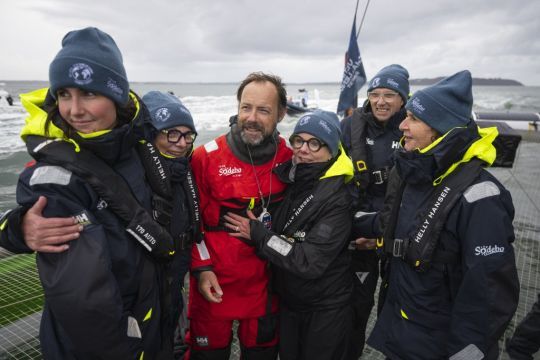
These difficulties are a source of learning and benefit to the teams, who grow and evolve as a result.
I like to draw a parallel with business, because it's a project that's intimately linked. If we want loyalty and commitment from the people who work with us, they have to find interest and pleasure in it. And that pleasure comes from learning and growing, from doing things that we didn't feel capable of doing.
It's a long-term, learning process. And I think that if this sponsorship lasts, it's because we've integrated it into the company's project, and that's what we're all about. We're growing together.
Returning to the ULTIM class, what memories will you have of this presidency, which has lasted since its inception?
I especially remember the beginning, when the various players in the class got together to discuss our vision and the values we wanted to inculcate in this young class, namely humanity and benevolence. These founding elements have ensured that the class is still standing after a decade.
There were some difficult moments, when Banque Populaire IX broke up and several boats were damaged, and the future of the class was in the balance. But one piece of good news led to another. Banque Populaire relaunched the construction of an ULTIM, and everyone focused on the common objectives of strengthening the boats and ensuring the safety of the sailors. We were coming out of a phase with a lot of innovation, but it was better to ensure the safety of the boats to come out of it with a more robust class.
How would you sum up the Arkea Ultim Challenge?
This project has been underway for almost 10 years, despite various obstacles delaying its initial progress. The goal was achieved at the outset, with an incredible line-up gathered in the port of Brest. But also at the finish, where only one boat was missing. This race was marked by some incredible stories. This only reinforces the power and importance of this project.
We've reached a new milestone with the success of this race, so I also think it was the right time to hand over the leadership of the class.
When the Arkéa arrived, Thomas announced that he didn't want to leave on his own. Are we coming to the end of this beautiful story?
Thomas is the sailor who has circumnavigated the globe the most, both solo and multihull. This 2 e place is a superb result. He also finds a lot of interest in the crew, creating a collective and finding complementary crew members. He'll be setting off again in a 2 e jules Verne attempt this winter, which he abandoned after breaking down despite having a good lead.
But in fact, to date, he's not aiming for another solo round-the-world race. But we have a permanent contract with Thomas. We have a good working relationship. If we were to change our collaboration, we'd talk about it long beforehand.
It's not the end of a contract that will decide what happens next. It's the context, the events, the desires of each and every one of us that will make us start thinking about what's next.
